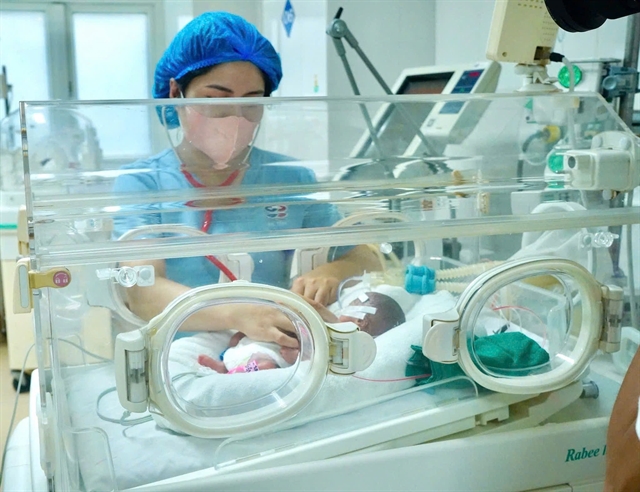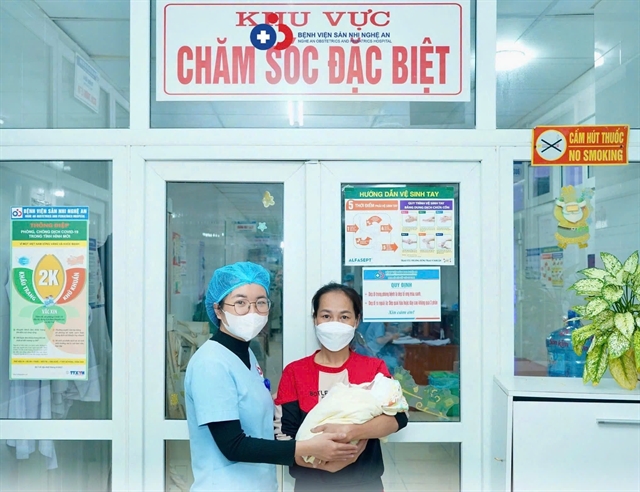 Society
Society

 |
| Baby Hến is the smallest premature infant to survive at Nghệ An Obstetrics and Paediatrics Hospital. Photos courtesy of Nghệ An Hospital |
HÀ NỘI — Baby Hến was born at Nghệ An Obstetrics and Paediatrics Hospital, weighing just 550 grammes on September 27 last year.
At only 25 weeks gestation, she was so tiny that she could fit snugly in the palm of a hand. Doctors had never encountered a case as premature and underweight as hers.
At birth, she showed no signs of life – she wasn't breathing, did not cry and showed no signs of reflexes. Her chances of survival were estimated at just 1 per cent.
Yet, refusing to give up hope, the doctors, her family and baby Hến herself fought relentlessly for her survival. After three months of intensive care, she reached 2.1 kilogrammes – the standard weight of a full-term newborn.
Hến is the smallest premature baby ever successfully cared for at Nghệ An Obstetrics and Paediatrics Hospital. Her one-hundred-day journey is a testament to resilience and medical dedication, with her survival at such a tiny weight hailed as a remarkable achievement by the hospital’s team.
Baby Hến’s fight to survive
Inside a small house nestled deep in an alley on Trần Hưng Đạo Street, Quang Trung Ward, Vinh City, in the central province of Nghệ An, Nguyễn Thị Hoa, baby Hến’ mother, couldn’t hide her emotions as she recalled the rollercoaster of emotions her family had experienced over the past months.
"It all feels like a miracle. I was 44, already old and when I was hospitalised with signs of preterm labour at such an early stage, our family had mentally prepared for the worst. The doctors also said that saving the baby would be extremely difficult," she told Sức khỏe & Đời sống, the Health&Life online newspaper.
Baby Hến would be the fourth daughter in the family, named after her parents’ rice noodle business. Before Hến, Hoa had given birth to a third daughter just 15 months earlier.
Previously, Hoa had gone through three pregnancies without recognising any signs of the fact she was going to have a baby for the first four months each time she had been expecting. In September 2024, feeling exhausted and experiencing persistent abdominal pain, she went to a local clinic for a check-up.
The results shocked her. She was 24 weeks pregnant.
Just three days later, Hoa showed signs of preterm labour and was rushed to Nghệ An Obstetrics and Paediatrics Hospital. For four days, she endured continuous pain, yet her waters had not broken.
"At 2am on September 27, my waters suddenly broke, but the baby was in a breech position, with her legs coming out first. The doctors quickly moved me to the delivery room. My baby was immediately transferred to the neonatal intensive care unit.
"Even though I had mentally prepared myself, hearing the doctor say that my baby had only a one per cent chance of survival left me utterly devastated," Hoa recounted.
The doctors stated that they had never encountered a case as premature and underweight as baby Hến.
"The doctors reassured our family that they would do everything possible to save her, but they couldn’t make any promises. If she could survive the first ten days, then there would be hope," Hoa explained.
Hoa and her husband counted each passing day. With every milestone, their hopes grew stronger.
After more than 20 days of intensive care, baby Hến gradually stabilised. Hoa was allowed into the neonatal intensive care unit, where she first saw her daughter through a glass window.
She vividly remembered that moment. Through the glass, she could see every strand of hair and every tiny blood vessel on her fragile daughter, who weighed just over half a kilogramme and lay inside the incubator, surrounded by tubes and wires.
"My heart shattered. She was impossibly small. How could I hold her, how could I care for her? I collapsed in tears. If the doctors hadn’t comforted me at that moment, I don’t know how I would have coped," Hoa said, wiping away tears.
Day by day, the doctors encouraged her, allowing her to see Hến more often until the baby was finally strong enough to leave the incubator and begin skin-to-skin kangaroo care.
Their efforts paid off. After nearly three months, baby Hến reached 2.1 kilogrammes and was ready to continue her journey with her family.
The first mothers
Dr Nguyễn Thị Thanh Huyền from the Neonatal Intensive Care Unit at Nghệ An Obstetrics and Paediatrics Hospital explained that extremely premature babies face severe risks due to underdeveloped organs.
These risks include asphyxia, respiratory distress syndrome, brain and lung haemorrhages, necrotising enterocolitis, metabolic disorders, hemolytic jaundice and, naturally, a mortality rate as high as 99 per cent.
To survive, baby Hến was placed in an incubator, supported by a ventilator, fitted with a central venous catheter and received intravenous nutrition through the umbilical vein. She was also given vasopressor medications to maintain her circulation.
Doctors carefully managed complications such as jaundice and retinopathy of prematurity. Her condition was closely monitored, with health checks performed every three hours to ensure her survival.
Despite being closely monitored with the best available medical support, there were moments when doctors feared they had lost baby Hến. She suffered episodes of cyanosis and critical distress, pushing her to the brink.
Yet, with the relentless efforts of the medical team and her remarkable will to survive, her vital signs gradually stabilised. Her weight increased and her organs slowly developed their functions.
According to Dr Huyền, from the time Hoa was admitted until delivery, baby Hến was under constant observation. Immediately after birth, she was intubated and transferred to the Neonatal Intensive Care Unit for continued treatment.
"When we received baby Hến, we were under immense pressure and concern. Faced with such a fragile life and the trust of her family, we were determined to give everything we had," she recalled.
Many medical staff joked that caring for a premature baby in the hospital often lasted longer than raising their own children at home.
Dr Nguyễn Thị Tú Anh from the Neonatal Intensive Care Unit shared that despite five years of experience handling complex cases, baby Hến’s case was the most challenging. She was the most premature and underweight baby she had ever cared for.
"Due to chronic lung disease from extreme prematurity, she was completely dependent on a ventilator for an extended period. When we first attempted to wean her off, she struggled, turning blue and gasping for breath, forcing us to resume ventilation," she explained.
 |
| Baby Hến in her mother’s arms in the hospital's intensive care unit before being discharged. |
However, on December 8, baby Hến successfully transitioned from mechanical ventilation to oxygen therapy.
Fifteen days later, she could breathe on her own and began learning to feed. The entire unit breathed a sigh of relief, knowing she was finally safe.
January 6 marked a major milestone when doctors decided she was ready for discharge after thorough health evaluations. Her organs had fully developed, and her condition was stable. Before leaving the hospital, she underwent hearing tests and screenings for retinopathy of prematurity.
Huyền emphasised that, due to her being born so early and with such a low birth weight, baby Hến still faced long-term health risks, particularly respiratory issues. Therefore, doctors provided her family with detailed guidance on her living environment and nutrition, recommending follow-up checkups every two or three weeks to monitor her progress. — VNS




